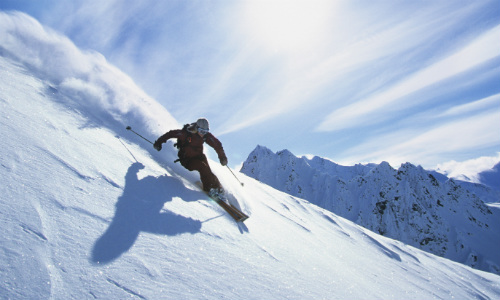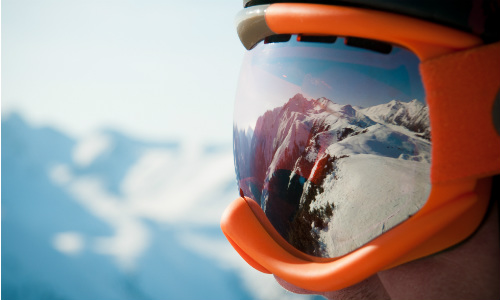Mind and body training for snow sports performance
- Overview
- Full article
Fight your fears

Getting into the right frame of mind is essential to reach peak performance in all sports, but when you're throwing yourself down a mountain top at speed, it's also a matter of safety. Fear can slow down reaction times and cause hesitation, with potentially disastrous consequences.
If you're worried you’ll freeze-up on the mountain, reframe your fears. Sit with the feeling rather than trying to avoid it and you'll be able to think about it more critically. Is your fear rational? Is it likely? What can you do to limit risk?
Adrenaline plays its part in heightening the effects of fear as your heart rate increases, but it can also be a tool to sharpen your performance, taking the edge off. This can be particularly useful if you’re coming back from injury or a long break from the slopes when you may be more nervous.
Use your imagination
Anyone who’s watched the Winter Olympics will have seen the skiers going through the motions as they imagine their perfect descent. Imagining yourself skiing the course through your own eyes (internal imagery) or seeing yourself as if on video (external imagery) will help your performance. Adding smells, sounds and sensations to the imagery will enhance it further.
Know your limits, then challenge them
On arrival, take a day to warm-up and establish your ski-level and physical condition, then take baby-steps to test yourself. Pushing beyond your comfort zone, and surviving, can be a significant confidence boost: no matter how well you perform, you’ll feel proud of yourself for trying.
Preparing your body
With simple preparation, your ski trip can be an excellent opportunity to push physical limits and come home feeling fitter than ever.
If you have any niggling injuries, get them checked out by a physiotherapist before you leave to make sure you start in tip-top condition. Once you're injury-free, kick start your ski legs with an exercise routine. A few half-hearted stretches on your first morning won’t cut it. Why not book yourself into pre-season technique course to brush up on your moves? Even upping your game in the gym can help: ask your PT for some ski-specific exercises to build strength and get your holiday off to a flying start.
Start low
While it’s tempting to aim for lofty peaks for guaranteed snow, as oxygen starts to decrease at altitudes over 2500m symptoms of mild Acute Mountain Sickness (AMS) can begin to occur. If you want to avoid puffing like an amateur or even crashing out entirely due to headaches, fatigue, dizziness, difficulty sleeping and loss of appetite, it pays to acclimatise slowly.

Take a deep breath
On a roll? Breathe! Make the most of a good run by focusing on deep breathing. Tense, stiff muscles are more likely cease up, leading to premature wipeouts. Deep breaths will relax the body, allowing you to enjoy the ride.
Food for the soul
Mountains are naturally uplifting places. Heighten the feel-good factor with these simple tricks.
Immerse yourself in nature’s beauty
Coming out of hibernation for a dose of winter sun is an excellent mood-boost during winter months when low vitamin D levels can leave you feeling flat. Not to mention the postcard-worthy panoramas and lung-fulls of crisp mountain air. Making time to pause and savour the natural beauty of the mountains is sport for the soul.

Find your flow
The swish of your skis in the snow, the mountain vistas blurring past you, the feeling of being at one with your skis, perhaps even your whole environment: psychologists call this experience ‘flow’ and claim it can help us focus on the present moment, feel happier and find greater meaning in life. Seek it out on the slopes for benefits that last all year.
Sleep to soothe your soul
Your ski holiday is a great time to reset sleep habits. Exercising regularly outdoors tells your body to produce the hormone melatonin earlier in the evening, improving sleep rhythms. Combine this with an abundance of fresh air and the sheer exhaustion of a day spent exercising means you’ll be too tired to scroll the internet before bed or stay up late. Embrace the opportunity to sleep better than you have all year.
Last updated Tuesday 5 February 2019
First published on Tuesday 5 February 2019
